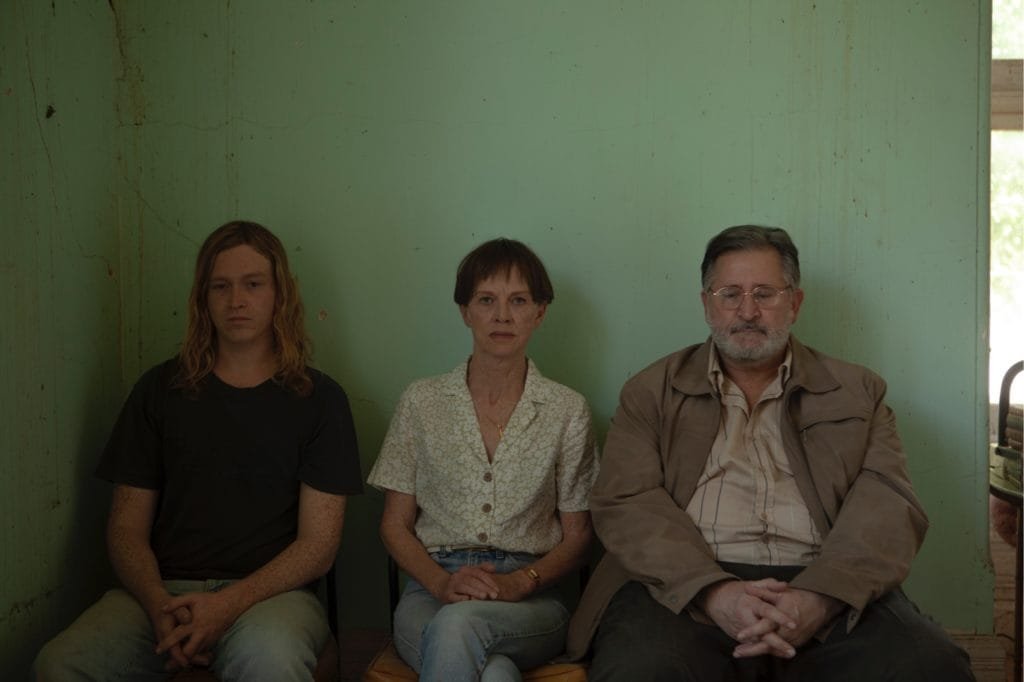
Nitram (2022) is an immensely uncomfortable film. Even with no idea of the real-life events on which it is based, you can still sense a disaster in the offing, right from the opening credits; we are privy to a close character study of someone lacking in the most basic signifiers of humanity. If you do know what is coming here – the film is based around the events of the Port Arthur shooting of 1996 – then you will still feel just as rootless and powerless as we veer ever closer to it. Director Justin Kruzel has been judicious in what he has left in and what he has kept out of his film: there is no sensationalism here, no danger of portraying events worthy of being emulated (a responsible decision for reasons addressed in the film, as well as a structurally intriguing one). But the unfolding chaos all still feels like it’s heading, irrevocably, in one direction.
The film opens with hospital footage of a little boy – the real Martin Bryant – who had burned himself with firecrackers; the interviewer asks him if he’s learned his lesson. Nope: I’ll do it again, retorts the child, completely missing the cue to join in on the moral. It sets us up neatly to meet the same person in adulthood (Caleb Landry Jones), still living at home and still setting off firecrackers to entertain himself, seemingly unable to understand his neighbour’s yelling or the frustrations of a nearby school headmaster, when he rocks up to hand out fireworks to boys ten years his junior: it’s a half-baked attempt to ‘make friends’, but like all of his attempts, it fails. It’s clear that something is up with this young man, but what? Physically, he seems normal, is even quite attractive – if unkempt – but he’s erratic, aimless, childish, and given to tantrums. Whilst his father (Anthony LaPaglia) makes excuses for him – grateful for any brief moments of normal family life – it’s clear that his mother can barely withhold her anger, and in trying to hide it, spits every line she speaks.
One day, going door-to-door in the neighbourhood to try and make money from mowing lawns, ‘Nitram’ -Martin spelled backwards – encounters a woman called Helen (Essie Davis) who seems unusually amenable to his efforts. They form a friendship – she’s lonely enough to see his lunging efforts at kindness as coming from a person genuinely capable of it – and he soon moves in. Helen is an heiress, so she’s wealthy, buying him a car and almost-everything he asks for. Money and the spectre of money runs through and thought this film: Nitram wants the means to fulfil his preoccupations, whilst his parents are stuck trying to manage him on their limited means, though his father has a pipe dream of buying a B&B out in the sticks: getting the cash together would mean easier lives for them all, he reasons. His parents are nothing but confused at their son’s sudden setting up home with an eccentric older woman, and his mother questions it: do you see him as a husband, or a son, she seethes – seeing as you have neither?

This odd set-up is short-lived in any case: Helen dies in an accident, in which Nitram is badly hurt too but, true to form, he learns very little, simply going through the motions of the time they had spent together back at the house – which, it transpires, she left in its entirety to him. He’s a rich man now, and he can buy the lot: the surfboard, the clothes, the plane tickets – and the guns. To come back to money again, we’re shown how people are blinded to all of this young man’s jaw-dropping personal failings by the kitbag full of dollars he starts lugging around with him.
These are people with plenty of lived experience, too. The film is noteworthy for the fact that the vast majority of its cast are middle-aged. Nitram’s parents, Helen, his psychiatrist, his nurse, even the travel agent. The subtext here is that these are people with professional and familial responsibilities who can’t evade contact, though they are still mightily flawed in their dealings with him. People of Nitram’s own age reject him outright; his mother is aware of this, and her half-baked suggestions that he could go and ‘meet a girl’ come couched in an awareness that no girl really deserves that. But she’s aware of his isolation, and still clings to this occasional, ill-conceived idea that he could find a way to be normal somehow – with a job, wife, kids. A life away from her. There’s the barest sense that she, too, knows that this will come to naught; Judy Davis’s performance is extraordinary, her eyes shining briefly with tears she stops herself from shedding, before she retreats behind a detached defiance she has learned the hard way.
Caleb Landry Jones already has a strong track record of playing outsiders, and he brings this experience to bear on his latest role. He manages to be magnetic and repellent here – a thoroughly dislikeable person who fascinates nonetheless. Reflecting the difficult line walked by filmmakers tackling emotive real-life cases of this kind, he manages to present Bryant as realistic and human, but not exactly humane: it’s as impossible to empathise with him as it is for him to empathise with others. He never reacts to events in expected ways, and he always seems on the verge of ruining the moment he’s in; if his lack of social skills is in some broader sense painted sympathetically, we are too up-close with Nitram’s jagged, uncomfortable traits to pity him. We don’t need to see the crescendo of his actions to know that someone as broken as this will lash out somehow. The film never grandstands on the social issues which facilitate this, but the devil is in the detail and it’s handled with sober, unflinching focus.
Nitram (2022) is in cinemas now.
